|
THE FIRST OF AN OCCASIONAL SERIES ON FIRST-TIME DIRECTORS ON OXFORDSHIRE'S AMATEUR THEATRE SCENE Kerrie McCormick co-directed Banbury Cross Players' production of David Haig's play, My Boy Jack in February this year, which certainly impressed this reviewer (you can read my review here). It tells the story of Rudyard Kipling and the loss of his son Jack in the First World War.
I spoke to Kerrie at her home in the village of Hook Norton, which she shares with her husband John, who acted in the play. How had she come to direct a stage play for the first time, I asked. 'Well, I was on play selection,' she replied. 'That's what we do, we pick the plays and do excerpts for the members. [My Boy Jack] was one of the plays that came up, and because it was a First World War play, and being the hundred year anniversary, we really wanted to get it done. Luckily the members said yes.' So Kerrie was made co-director, the first time she'd ever done that job. Had she had any acting experience before, I wondered, a common route in amateur theatre? Apart from a bit when she was at school ('but that was a long time ago,' she chuckled) and a role in the village panto, no, she hadn't. I was curious to learn more about what knowledge and experience she drew on as a director. As part of the play selection team for BCP, Kerrie had immersed herself in literature. 'I read a lot of books and plays,' she said, pointing to the bookshelves crammed with volumes all round their sitting room. 'This is not all of it. We've got books all over the place. I really enjoyed it and got to look at a lot of things I wouldn't have looked at before. I'm also in a literature group in the village, and we go and see plays.' I asked Kerrie about working with a co-director and she explained that they divided the scenes between them and each worked on their own. I wondered whether she was mentored or shadowed, but Kerrie was left to her own devices and had the freedom to develop her own scenes as she wished. I was impressed for two reasons. The quality of the finished work was high and you couldn't see the join (between the work of the two different directors). We talked about her relationship with her actors. 'I wanted to talk more about the scenes, at the start, and then explained what the audience is meant to feel, what the writer wants them to feel. I like to get their opinion, the actors, because they've got an imagination as well. I don't think it's just a case of “stand over there and turn 45 degrees to the right”. It was a collaborative effort in as much as if one of them asked, “what should I do?” I would say, “well, what do you think you would do in that situation?” and go for that, what feels natural for you, because I think that works better than getting them to do something that feels really false.' What about developing the characters, how did she approach that with the actors? 'We talked about it and had suggestions, but, especially at the start, I wanted to let things go without me having to say “let me stop you there”. Things would work themselves out. I think if you're stopping them all the time, you make them feel nervous and you lose the flow. We really enjoyed it, we had a lot of laughs, but worked hard. It's got to be fun because, for a start, they're volunteers, they're not getting paid for it. It's not penance!' So what did she get out of her first play as a director? 'I loved it. The satisfaction of seeing something that you've worked on come together and also when the reviews come out, that they're good! Because you think you've done all right, but there were things that we could have done different. There were a couple of the scenes that I thought detracted from the ending, where the wedding came in and that flashback – I think we could have cut those and it would have been more powerful. But that's looking back.' Kerrie casually drops into the conversation that she contracted pneumonia in the two weeks leading up to the performance. By this time, John her husband has come into the room and points out that such had been the work Kerrie had put into rehearsing that they, the actors, would have felt ready to perform it to the public two weeks before curtain up if they'd had to. All the main work had been covered and that final fortnight simply required a little tweaking. I'd see that as a tribute to Kerrie's thoroughness and ability to inspire her actors. So what tips would she give to other beginning directors in amateur theatre? She paused to think for a moment before saying: 'Definitely to go for it. Have confidence in yourself. I was open to change but I knew what I wanted to do.' She certainly did. I ask her about future plans, other plays in the pipeline. She would love to do Simon Gray's Quartermaine's Terms next, but the decision about that is in the hands of the other members of BCP, but if Kerrie's first effort with My Boy Jack is any indication, they could have another success on their hands. Photo copyright: Mike Lord
0 Comments
ROMEO AND JULIET by William Shakespeare Our Lady's School, Abingdon 6-8 February 2018 In the programme notes to this superior school production of Shakespeare's play, director Dr Elizabeth Lawson recalls the impact that Romeo and Juliet had on her as a girl. Specifically, Romeo and Juliet in its film incarnation starring Leonardo DiCaprio. For her, as a teenager, Shakespeare, post-Leo, became cool. A previous generation had a similar experience with the same tragic tale of love in Leonard Bernstein's West Side Story, and it was to a gang war in contemporary New York, this time in Manhattan, that this slick production turned for its setting. The name Manhattan has syllables than scan identically to Verona, the original location of Shakespeare's story, which is a happy happenstance that preserved the rhythm of Shakespeare's lines intact. With a cast of 53, and well over two dozen backstage members, this was not a production that did things by half. Combining Shakespeare's text with musical dance sequences gave the whole evening a lavish feel not a million miles away, in spirit at least, from the aristocratic families of 16th century northern Italy. Music was very effectively used throughout, between scenes and during the choreographed crowd set-pieces. Current dance and hip-hop tracks were the main fare, but I caught a few snatches of older pieces, including a sample of the intro to Minnie Riperton's 1975 hit 'Lovin' You'. The play opened with a title sequence of the main characters projected on to a back screen ringed by LED lights, with each actor taking a bow as his or her character's name appeared. It was a clever device to avoid the audience scratching their heads later over who's who, when they should be concentrating on the plot. We then went straight to the opening street brawl between the Montagues and Capulets. They squared up to each other, armed with quarterstaffs, with which they rhythmically banged the ground with deliberate menace to a musical track. A well choreographed fight sequence followed, in which quarterstaffs clashed perfectly in time together, like so many merry men, to be broken up by the NYPD. The cops were led by Prince Escalus, played by Enya Hagan, who bawled at the crowd in possibly the loudest voice of the evening. You wouldn't want a parking ticket from her. It set the flavour of the production. With a cast of such epic numbers, it's not possible to mention all, but here are some brief reflections on a few of the principals. Ben Murray was an engaging Romeo who used a facial expression that said, 'I know this lurve thing is awkward and my mates are taking the Mick, but what the heck?' Bethan Corley's Juliet was the good girl knocked for six by Cupid's arrow, but wanting to do the right thing. Mercutio is, in my opinion, the best part in the play. He's sympathetic, gets some great lines and plenty of gags, plus the actor can head off to the bar for the second half of the play. John Gildersleeves was well cast, delivering the humour without milking it, and made a good team with Benvolio (played in appropriately laddish fashion by Freddie Lee) to rag Romeo. 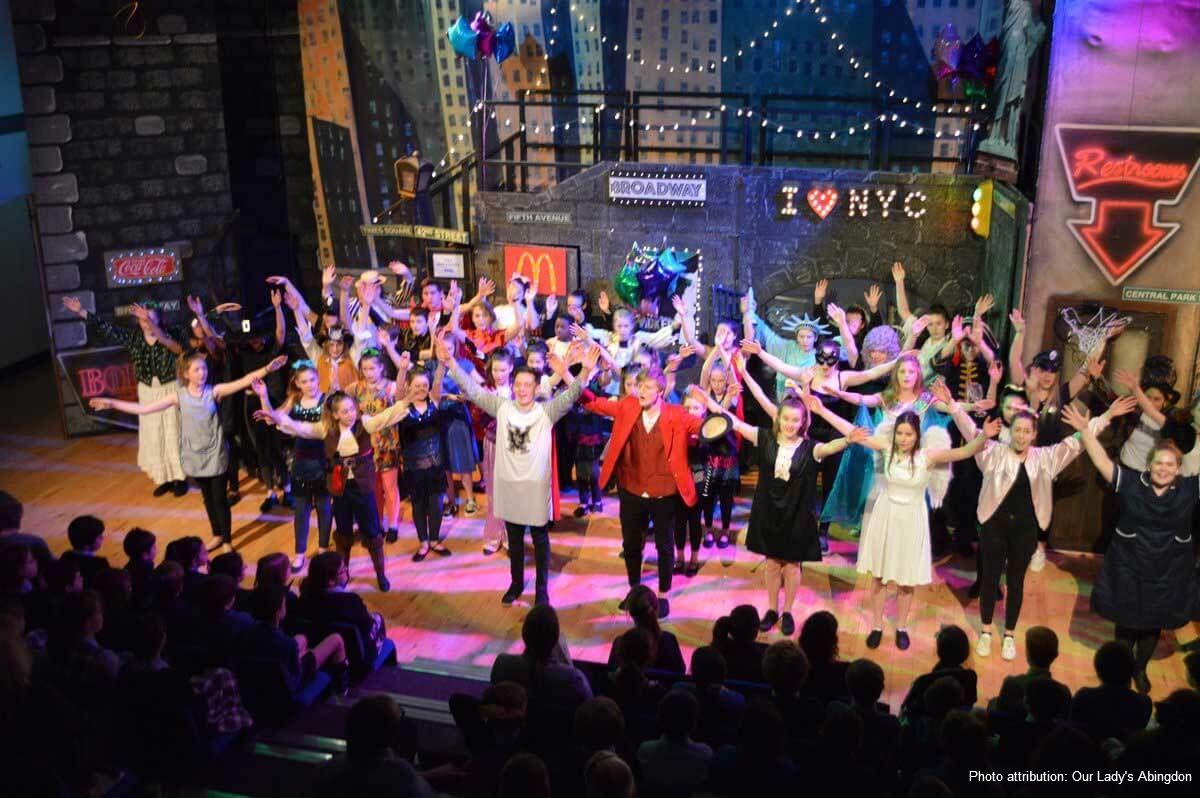 The final curtain call: all 53 cast members on stage The final curtain call: all 53 cast members on stage Tybalt was a nasty piece of work. If this had been a Martin Scorcese film, he would have been the Joe Pesci role. I felt no regret when Romeo despatched him, so kudos to Dominic Warburton, dressed in black, who played the role. My personal favourite of the evening was Caitlin Stone's Nurse, who showed some brilliant comic timing and gave us plenty of business without going overboard. Danann Kilburn was cast as Friar Lawrence, but in this production the character was a trendy lady vicar, who wore tinted round sunglasses borrowed from Ozzy Osbourne. She also got to play with the blue LED cross on the gates to the friary. Oh, and there was also some decent acting going on in the meantime. I also liked the sartorial contrast between the heads of each feuding family. Tom Wellesley's Lord Capulet in white linen jacket over Hawaiian shirt versus Endre Bessenyei's Lord Montague in business suit. Designing costumes for so many cast members was a Herculean task, but that didn't seem to mean any drop in quality. The Hawaiian shirts versus all-blacks theme provided a clear contrast between the two families, while keeping the gang setting in mind. The costumes at the party where our hero and heroine meet also impressed. The set was well designed with obligatory balcony that was nicely integrated into plenty of other scenes. It was dressed with New York street furniture and even a carousel (the location of Romeo and Juliet's first verbal exchange). Congratulations too to the sound crew who had to cue many dozens of music tracks, all of which appeared on the night I went, to come in on time. Well done to the lighting crew for enhancing the atmosphere through all the levels from party to funeral. OLA's Romeo and Juliet showed that focused imagination, flair and sheer hard graft will pay off in a great theatrical experience for audience, cast and crew alike. We all had a great time. Photo Attribution: Our Lady's Abingdon MY BOY JACK by David Haig Banbury Cross Players The Mill Arts Centre, Banbury 7-10 February 2018 My Boy Jack is the story of Rudyard Kipling and his grief for his son, who was killed in the First World War. The bereavement forces Kipling to re-examine his own relationship with Jack and, ultimately, his attitude towards the war. Written as a stage play by the actor David Haig, and later turned into a film, My Boy Jack is a spare, moving and intense piece of theatre. I'm pleased to say that Banbury Cross Players' revival does it justice. Kerrie McCormick should take quiet satisfaction from her directorial debut (alongside co-director Helen Watson). When we first meet Rudyard Kipling, he is a keen supporter of the war effort and writes and speaks publicly to encourage young men to enlist in what he sees as a war for civilisation against German barbarism. His own teenage son Jack is also encouraged to join up, but he has failed his medicals for the Royal Navy and Army because of poor eyesight. Kipling uses his influence to get Jack a commission, nonetheless, in the Irish Guards. At the Battle of Loos in 1915, Jack is reported Missing in Action. Kipling is a large role to take on, and the production stands or falls with the ability of the actor playing the great man. Philip Fine did not let us down. After a slightly unsure opening scene, Fine blossomed into the role. For much of the play we had the 'Hail fellow, well met!' Kipling who thinks he is doing the best for his son and his country. Only later does he see another side to events; and then we see another side to him. He is shocked by his daughter's revelation that Jack's true motive in joining the army was not King and Country, but a desire to escape the suffocating environment of his family home. That is a dagger in Kipling's heart. His wife Carrie (Deborah Watson) administers a second. She mistakes Kipling's struggle to see some good in Jack's death as a lack of feeling. Wounded by such a remark, Kipling breaks down and reveals his deep grief over his son's death and his feelings of guilt that he was responsible for driving him to his end. It is the turning point in our understanding of Kipling and Fine handles it adeptly. The outpouring is intensely portrayed but never over the top. In the following scenes, we are back to the more familiar cheerfulness, but the tinge of melancholy lingers in Fine's performance. Jack Kipling is a young man who has to grow up very fast. Joe Deakin successfully takes the character from awkward teenager, frustrated by his father's micromanagement, to cub second lieutenant, battling both his own fears and the rebelliousness of his Irish troops to take them over the top to almost certain death. A young talent to watch. Dani Turner, as Kipling's daughter Elsie (called by her nickname 'Bird'), brought a huge injection of energy into the production from her opening scene onwards. Her presence on stage seemed to crank up the rest of the cast, who had made a competent, but slow start, and show them, and us, just how it should be done. By turns cheeky, rebellious and loving, Elsie is not afraid to tell her father how much she disapproves of his ambition of getting Jack to the join the Army and face front line action. Dani Turner gave us an Elsie unafraid of her emotions, devotedly loyal to her brother, and fun to be with. You'd probably want her sitting next to you at a dinner party! Deborah Watson's Carrie Kipling started slowly but picked up as the first act progressed. Kipling's wife provides an emotional anchor for her children as well as opposition to Rudyard's military ambitions for their son. Watson had an attractive stillness about her performance that worked well. What I would have liked to see a little more was greater warmth in Carrie's relationship with Elsie and Jack to provide a contrast with the conflict the children had with their father. Something for the directors to mull over perhaps. Guardsman Bowe (John McCormick), a farmer from County Clare, Ireland, serves in Jack's platoon. We see him first in the trenches in an ensemble scene with two other Irish Guards (played by Jem Turner and David Hornsby with foul-mouthed stroppiness and resignation respectively). But Bowe's main appearance comes two years later in the Kiplings' library, as a shell-shocked invalid who has half lost his mind. Kipling has spent the years since Jack's disappearance interviewing hundreds of soldiers for news of his son's last moments. Guardsman Bowe brings the dreadful news that at least gives Jack's parents the closure they seek. For me, McCormick's performance was a highlight of the evening. A sustained, demented, rambling that circles round the piece of information that Rudyard and Carrie seek, going closer then backing away, repeatedly, as if from a candle flame, until the final reveal. The performance kept the emotional intensity going right to the end.
Chris Garrett deserves especial praise for his simple but ingenious set design. An Edwardian library in Kipling's 17th century Sussex home that literally splits in two to reveal a trench on the Western Front, capturing the claustrophobia of that hell-hole. Credit also to John Hicks and Linda Shaw for their atmospheric lighting and to Michiel van Niekerk for soundscapes that brought us the unceasing rain and explosions of the battlefield. Rob Hall's projections of film footage from the First World War between scenes added to the atmosphere without falling into the trap of using technology for the sake of it. My Boy Jack was an enjoyable evening out (if that's the right word) and Banbury Cross Players are to be congratulated on their choice of a piece that does not seek to demonise anyone, but to shine a light on the proper subject of art: the human condition. Photographs: Courtesy and Copyright Mike Watling |
About the Author
Mike Lord has been involved with amateur theatre for over twenty years, mainly as an actor but also, more recently, as a director. Archives
July 2019
Contact me
Please use the Contact Form for anything apart from comments on blog posts. |


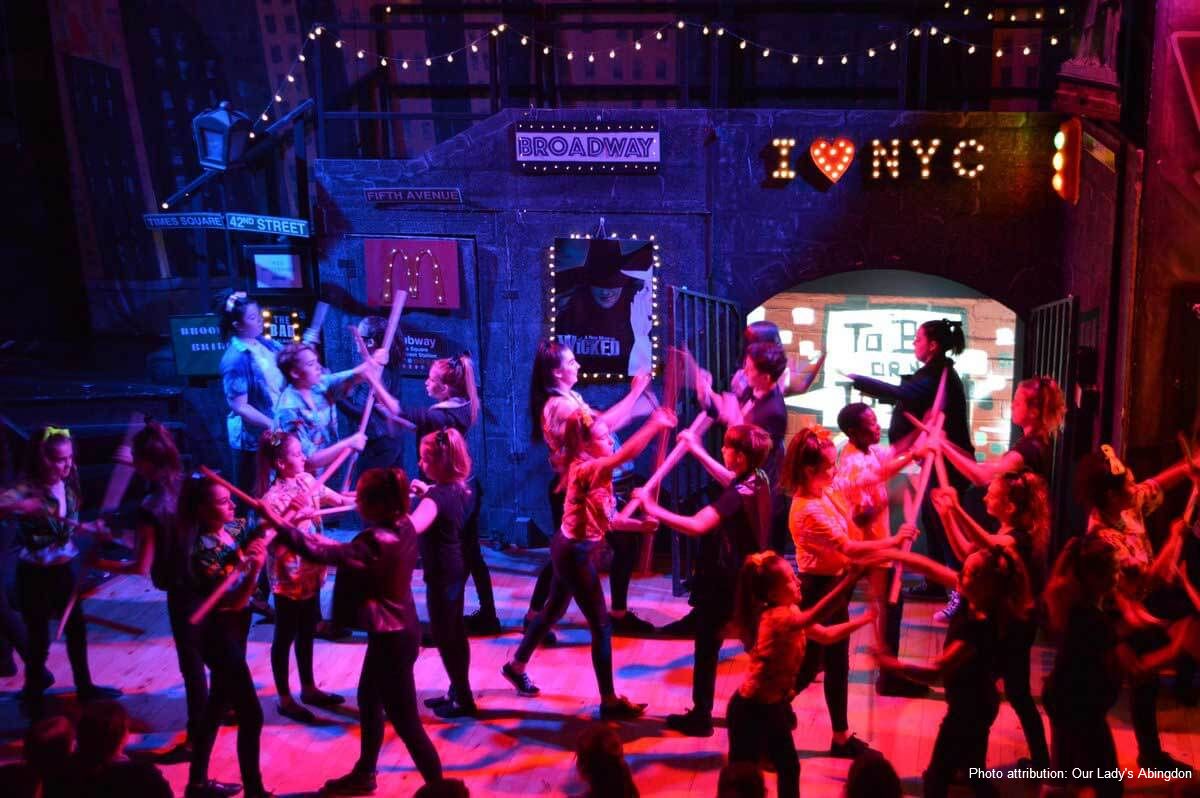
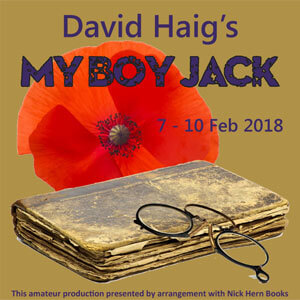
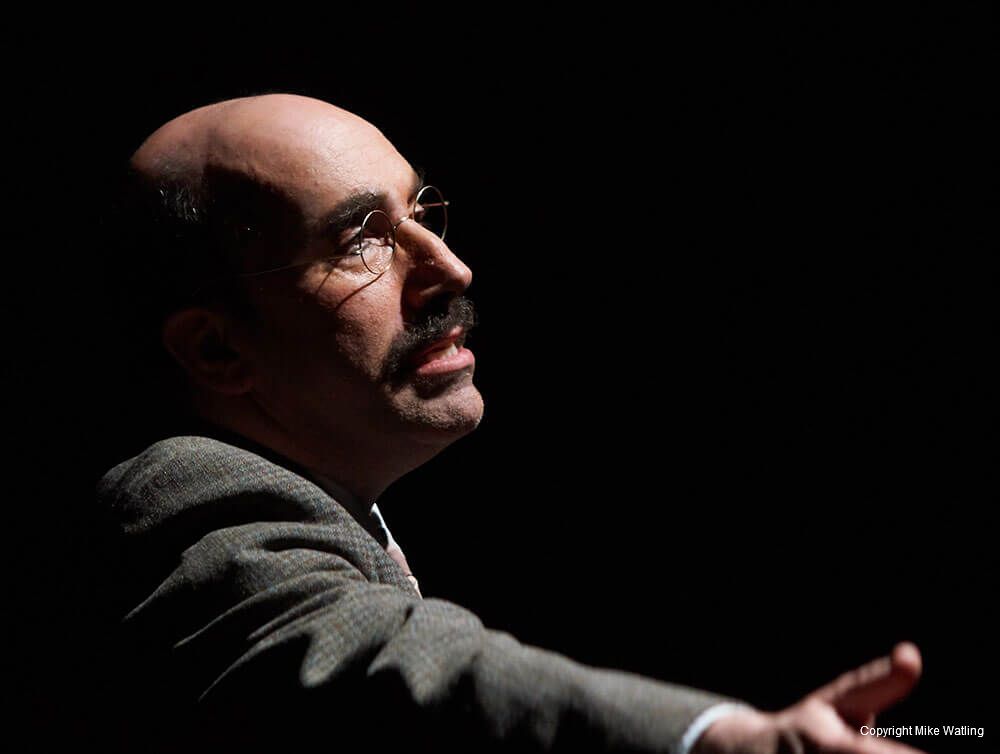
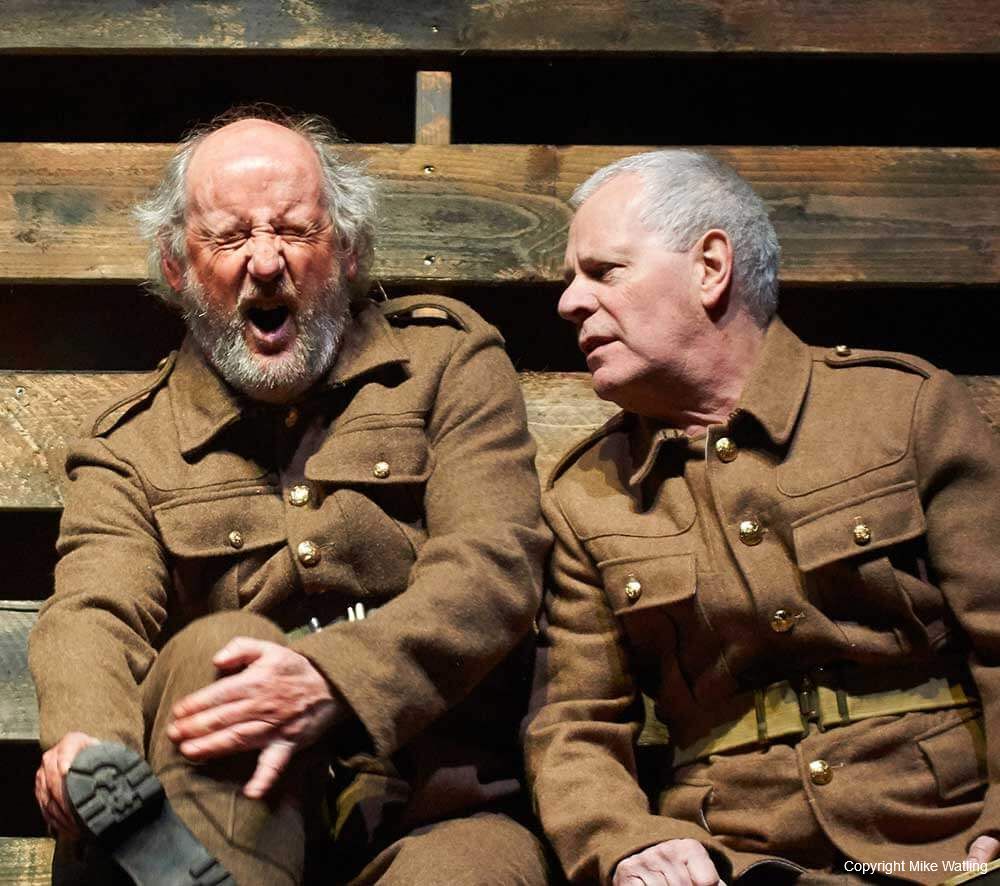

 RSS Feed
RSS Feed
